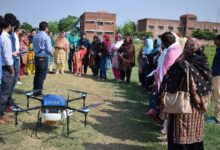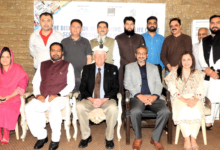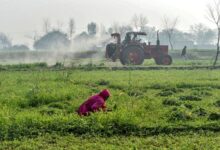Experts speak out: How can climate change negatively impact Pakistan’s economy?
Environmental experts advise govt to devise policies on climate change & warn against negative impacts
Islamabad: Speakers at a conference suggested the government devise climate change policies which can be practically implemented.
While they also emphasized the government to raise awareness on climate change and mitigate its negative impacts.
They were speaking in an online roundtable discussion on “Climate Change as Non-Traditional Security Challenge: Relevance for Pakistan”.
The event was jointly organized by Center for Global and Strategic Studies (CGSS), Islamabad and Hanns Seidel Foundation (HSF) Pakistan.
It is important for Pakistan to raise awareness on climate change and mitigate its negative impacts, said Dr Kudella, adding that climate change is both the rise of the average temperature of the Earth’s climate system and large-scale weather shifts.
“It is one of the most threatening situations for Pakistan”, he added.
The climate change expert further said that these non-traditional security challenges are non-military in nature, but risks to the survival and well-being of people.
Dr Kudella pointed out that the rising temperatures are leading to the melting of glaciers in Pakistan.
Moreover, they lead to a degradation of ecosystems, impact biodiversity, and cause desertification and flooding, which in turn can cause serious problems such as mass migration, starvation or poverty. He emphasized on the importance of holding these roundtables to address critical issues.
Former Secretary of the Climate Change Ministry Romina Khurshid Alam said that climate change is a subject on which we all need to work cohesively.
She said that pollution has also increased in this pandemic and explained that Pakistan has the Climate Committee and is working to mitigate the negative impacts of climate change. Alam suggested that in this regard think tanks can play an important role in the policy orientation process and the government should implement the devised policies.
Director of Riphah Institute of Public Policy Dr Rashid Aftab said that the outcomes of climate change are devastating as Pakistan is among the top 10 most affected countries. This has led to water insecurity.
Dr Aftab explained that climate change can lead to a number of challenges, including scarcity of water. Water availability will become erratic and put strains on the population. Third, this situation will result in higher evaporation rate and raise demand for water.
Dr Aftab said that if these factors are likely to continue, it will increase the frequency of droughts. He suggested that the government should devise policies which can be practically implemented.
Former chairman PARC Dr Yusuf Zaraf said stated that Pakistan energy consumption is low and it is not contributing much to GHG. He suggested that if we want our national food security, we should properly opt practical solutions.
Dr Yusuf discussed that Pakistan is facing certain issues related to food security this year which is alarming as our productivity is low. He suggested that isolated actions should not be beneficial; therefore the government should revisit the plan under climate change scenarios and incorporate technological advancement in the agriculture sector to enhance productivity.
Dean faculty of Basic and Applied Sciences, IIUI Dr Muhammad Irfan Khan said that environment security in terms of water, food and energy is considered an important aspect of national security.
Therefore, the nexus builds important links between environment and national security. Dr Khan stated that the link is reshaping contemporary political discourse as it has been impacting national security. He said that this changing discourse is to translate contemporary security concerns and broaden the national security agenda that should include climate security.
Dr Irfan suggested that there is a need for environmental policies among the provinces and also SAARC countries to develop environment security and peace which are imperative to achieve sustainable development.
Tariq, another environmental expert, said that now, environmental security concerns have been incorporated into the foreign policy agenda.
Member Board of Experts, CGSS Dr Muhammad Khan said that the NTS challenges transcend the national boundaries as they are transnational in character. They have sudden unexpected appearances.
Dr Irfan said that human security is endangered in South Asia because of regional sensitivity to climate change. He stated that as far as climate change is concerned, it has been impacting humanity. Every country has a strategic linkage and effective policy making to mitigate negative impacts of climate change that need to be explored.
Climate change has adverse effects. Therefore, mitigation could not be successful until or unless there is cooperation among all sectors, he maintained.
Dr Irfan stated that water security, agriculture and availability of clean drinking water are the key concerning areas to discuss.
NDU Dr Shaheen Akhtar stated that we need to look between environment change and national security. She stated that climate change is an emerging threat to national security. Dr Shaheen highlighted that the rising temperature will increase irregular rainfall patterns and precipitation levels.
Dr Akhtar suggested that there has to be sectoral approaches. If there is no preparedness to mitigate these challenges, there would be huge repercussions.
She stated that disaster-risk reduction plans and preparedness are important with the involvement of all stakeholders to mitigate the repercussions imposed by climate change.
NIMA expert Dr Kanwar Javed Iqbal elaborated that the global community has consensus that climate change has emerged as the issue of national security and human security. Dr Kanwar stated that ocean-based economies are more vulnerable to climate change as sea level is rising.
He also raised points on Pakistan’s drought situation that the Sindh province is highly affected by the droughts, increasing vulnerability to its huge population. He stated that the drought condition has impacted the Melon crops.
He suggested that there is a need to have a national policy on the environment plan. He also suggested active engagement and safe participation between multiple think tanks and relevant stakeholders.
IIUI Dr Sarah Amir said that climate change and its impacts is the pressing issue. She discussed that a lot of jargon has been introduced in the last decade like climate smart agriculture or non-traditional security threats and that climate change is not a myth but reality. She suggested that we cannot delay implementing climate change related policies.
Executive Director of DEVCOM Munir Ahmed stated that we need to have specific research. There has been no significant agenda of the working climate committees. Climate change is the biggest threat. It affects everyone. Therefore, non-traditional security threats should not be handled by traditional methods.
Munir emphasized the need to educate people in each constituency. He also suggested that the funds that are being given by certain organizations and NGOs and how,in this regard, the role of civil society is significant.
Ali Tauqeer Sheikh, founding CEO & National Program Director of LEAD Pakistan, and CDKN’s Regional Director for Asia stated that the response to non-traditional security threats should be non-traditional in nature.
NTS need not be totally domestic or interstates as they are overlapped. Ali stated that many issues that are domestic also become regional or international. He gave examples of climate-related transboundary issues i.e., cyclones and tsunamis, air pollution, smog, migration and refugees, pandemic and epidemics.
Chairman Gomal Daman Area Water Partnership Pakistan Brig (Retd) Muhammad Aslam Khan stated that we need effective strategies to beat climate change.
Therefore, Pakistan should undertake reform plans like the KP government. Dr Aslam also suggested that there should be an effective water management program along with protection and restoration of the ecosystem. He also highlighted the role of youth in building awareness.
Forte, Integrated Water Resources Management Chairman Dr Hassan Abbas stated that we should not forget that a lot of products which we are using are imported materials. Therefore, we have to do careful consideration to our consumption related to industrial GHG emissions.
He emphasized that water is the most impacted element by climate change. He explained that we have developed infrastructure to modify our natural flow regime.
Dr Hassan recommended that before focusing on one type of solution like the old-mind set of diverting rivers, we should move toward alternatives to manage water.
Therefore, climate change should be discussed widely in parallel to invest in the same amount of investment in developing the alternatives, he added.
PCRWR Director Faizanul Hassan said that the challenges are due to climate change. In this regard, there are some questions we need to answer related to climate change, its vulnerability and mitigation.
Hassan stated that the German watch Global Climate Risk Index 2021has placed Pakistan among top 20 most vulnerable countries. He explained that climate vulnerability has been ignored. Therefore, there is a need to generate awareness among people regarding the issue of climate change.
Dr Steffen Kudella, representative of Hanns Seidel Foundation Pakistan stated that Pakistan is vulnerable to climate change and suggested that responding to these effects is a responsible manner, collectively.





